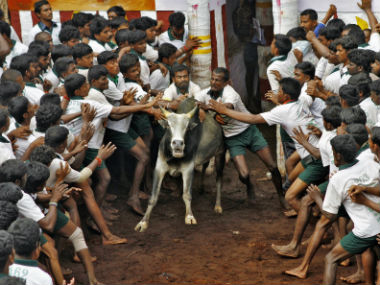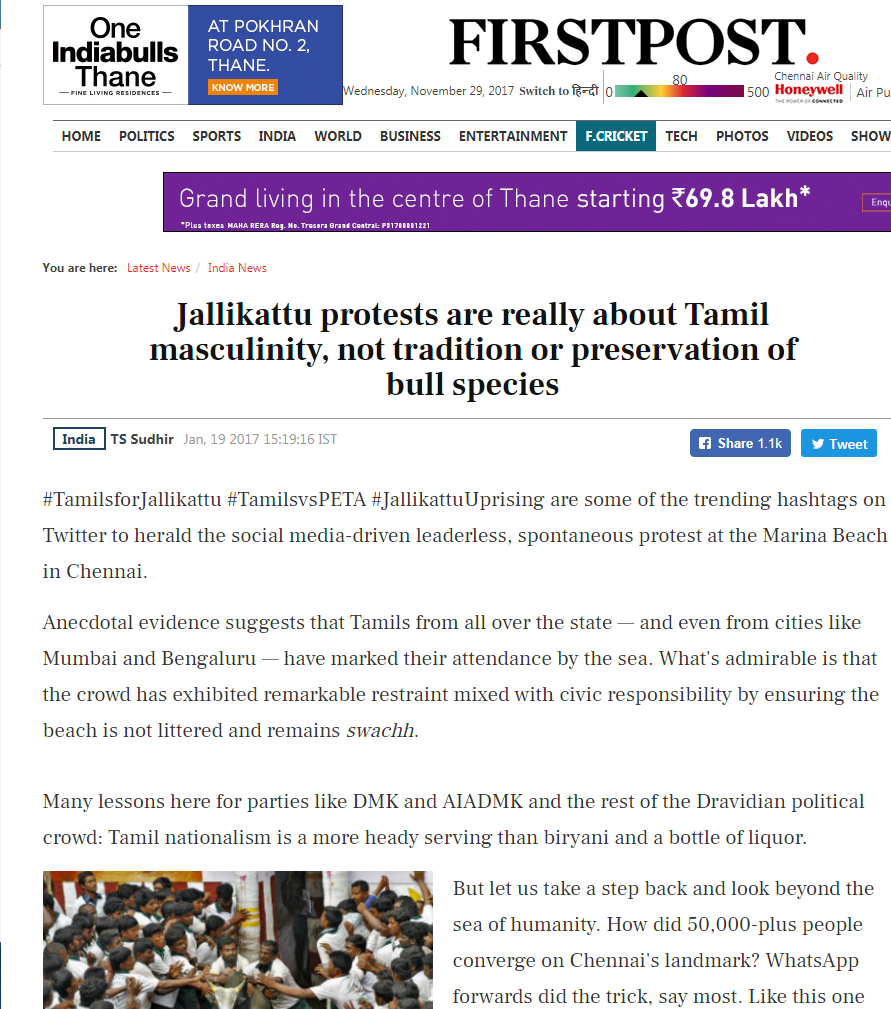Jallikattu protests are really about Tamil masculinity, not tradition or preservation of bull species
#TamilsforJallikattu #TamilsvsPETA #JallikattuUprising are some of the trending hashtags on Twitter to herald the social media-driven leaderless, spontaneous protest at the Marina Beach in Chennai.
Anecdotal evidence suggests that Tamils from all over the state — and even from cities like Mumbai and Bengaluru — have marked their attendance by the sea. What’s admirable is that the crowd has exhibited remarkable restraint mixed with civic responsibility by ensuring the beach is not littered and remains swachh.
Many lessons here for parties like DMK and AIADMK and the rest of the Dravid ian political crowd: Tamil nationalism is a more heady serving than biryani and a bottle of liquor.
ian political crowd: Tamil nationalism is a more heady serving than biryani and a bottle of liquor.
But let us take a step back and look beyond the sea of humanity. How did 50,000-plus people converge on Chennai’s landmark? WhatsApp forwards did the trick, say most. Like this one that appealed to Tamil pride and identity: “Nee Thamizhana iruntha, ezhunthu nil.” (If you are a Tamilian, stand up in support).
Someone had worked on serious social media mobilisation, identifying vulnerabilities in the Tamilian mind. Mass media did its bit, packaging the jallikattu ban as an insult for Tamilians. Very soon, the crowd was wearing victimhood on its sleeve, with some of them threatening to observe 26 January as a ‘black day’.
But is it indeed a pan-Tamil Nadu sentiment, as the visual evidence seems to suggest? Jallikattu, though played for over 2,000 years, has traditionally been confined to a few villages in Madurai and adjoining districts. A vast majority of those who have assembled at the Marina have neither watched jallikattu in their life nor do they completely understand the tradition. But they are holding up banners in its support because they’ve been convinced that a ban on the bull-taming sport (or bull embracing, as votaries of jallikattu insist) is a threat to the Tamilian’s Dravidian identity. At a very subliminal level, the invisible Pied Piper behind the ‘Occupy Marina’ protest has aroused sentiments of regional nationalism.
Add to the mix video messages posted by Tamil film stars, further underlining the ‘jallikattu = Tamil pride’ sentiment. There is a reason why stars like Vijay, Kamal Haasan, Suriya, GV Prakash, Vishal, Jayam Ravi, Simbu, etc have all vociferously supported jallikattu. Madurai is a very important market for Tamil films and no one from the industry would like to be on the wrong side of what seems to be popular street opinion.
Secondly, bull taming is equivalent to veeram and pourusham; it denotes macho Tamil nationalism. It goes with the image these stars project.
In villages like Alanganallur and Avaniyapuram in Madurai, home to grand jallikattu events, taming a bull on the rampage is usually a ticket to a woman’s heart. That is also the manner in which it has been portrayed in several Tamil films. It is this male honour and masculinity that is being dished out as Tamil culture now. Unfortunately, the machismo turned rogue when some pro-jallikattu elements trolled a female actor like Trisha with abuse of the worst kind because she was not seen to be supporting the sport. Under pressure, she fell in line.
The move to present it as ‘Tamil Nadu for jallikattu’ is also erroneous. Dalit activists point out that the sport is just another tool to perpetuate the hegemony of a few powerful castes in villages. They say Dalits, barring at a couple of villages, are mere spectators of this non-inclusive sport. Which is why if you scratch the surface at the Marina, you will find faultlines showing up in a caste-obsessed Tamil Nadu.
Who is on target? The most obvious villain is PETA (People for Ethical Treatment of Animals), which played a crucial part in getting jallikattu banned. Narendra Modi also comes in for criticism, as he is seen as someone who is not willing to fight for the Tamil cause in the Supreme Court. That is an unfair criticism, however, as Modi’s government did pass a notification last January allowing jallikattu, only for it to be struck down by the apex court. Once bitten, the prime minister is understandably twice shy.
With no immediate solution in sight, the jury is out on how long the crowds will stay at the beach. The narrative each of them dishes out is repetitive: Jallikattu is not cruel. Period. We need an ordinance. Period. Very few even know that jallikattu was in fact permitted under the Tamil Nadu Regulation of Jallikattu Act, 2009. But activists found that the bulls were abused despite reasonable restrictions. The Supreme Court, based on the evidence at hand, banned it in 2014.
On Thursday, Chennai-based techie Kiruba Shankar who also does farming in his village, posted a photograph of a cow, with vermilion and sandalwood paste on its body, sitting next to a garbage bin and left to eat plastic. He shot the photograph in the Virugambakkam area of Chennai, about 12 km from the Marina. The visual begs the question if the protest is inherently hypocritical. Is it indeed to save the native bull species and produce healthy cows or is it more about Tamil masculinity?

